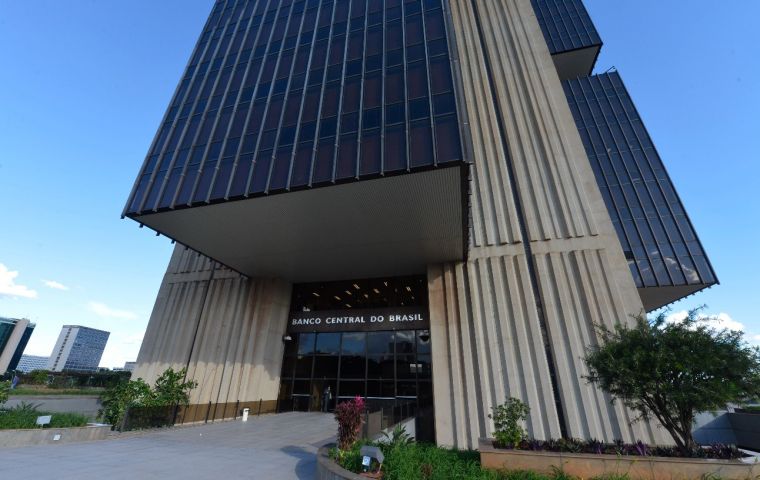MercoPress. South Atlantic News Agency
Brazil Central Bank leaves benchmark rate unchanged at 13,75%; warns about fiscal policy
 Copom reiterated that they “will not hesitate to resume the tightening cycle” if inflation does not cool as expected.
Copom reiterated that they “will not hesitate to resume the tightening cycle” if inflation does not cool as expected. Brazil's Central Bank on Wednesday left the Selic benchmark interest rate at 13,75%, but in the adjoining release, the bank's rate setting committee, Copom said the high interest rate policy is expected to last longer than market expectations because of fiscal risks
Although the rate decision was no surprise, the accompanying statement indicated how a newly independent central bank would act under the recently inaugurated Lula administration.
“The current scenario, particularly uncertain on the fiscal side and with inflation expectations drifting away from the inflation target on longer horizons, requires further attention when evaluating risks,” Copom said.
Policymakers said they were weighing whether holding the Selic policy rate unchanged for longer than most forecasts in the bank's weekly survey of private economists will be enough to bring inflation back to target. Copom reiterated that they “will not hesitate to resume the tightening cycle” if inflation does not cool as expected. Some market experts believe that the independent Central Bank could hold onto high interest rates until 2024.
The median forecast in the central bank's most recent Focus survey pointed to a first rate cut of 25 basis points in September, followed by cuts of half a percentage point each in November and December to end the year with the Selic at 12.5%.
In Wednesday's statement, policymakers introduced “an alternative scenario” in their models, with interest rates steady through 2024 and inflation converging to around the central bank's target next year.
Selected by former President Jair Bolsonaro to head the central bank, Roberto Campos Neto had his mandate extended to the end of 2024 under a new law granting the bank formal autonomy, setting up an unprecedented situation in Latin America's largest economy.
Lula said formal central bank independence was “nonsense” and argued the current inflation target hinders economic growth, in remarks that rattled markets before officials quickly pointed out no changes were planned to the central bank or its inflation goals.
Since taking office on Jan. 1, Lula has criticized Brazil's high interest rates amid cooling consumer prices. Annual inflation, which ran in double digits from September 2021 to July 2022, fell to 5.87% in the 12 months to mid-January.
Still, that is well above the bank's official inflation targets of 3.25% in 2023 and 3% in 2024, with a tolerance margin of 1.5 percentage points up or down.
The central bank, which paused an aggressive tightening cycle in September after 12 straight rate hikes, has avoided open confrontation with the new government. But Campos Neto highlighted that additional spending planned by the Lula administration was already affecting inflation expectations since last year.
Furthermore Brazilian Finance Minister Fernando Haddad announced a package of measures to increase revenue and cut spending to slash the wide hole in this year's public accounts.
“We will pursue the goal of closing 2023 with a primary deficit between 0.5% and 1% of gross domestic product,” he anticipated at a news conference.
The fiscal shortfall in this year's budget is forecast at 2.1% of GDP, equal to 232 billion Reais (US$ 46 billion).
Haddad presented a broad list of actions whose impact was estimated at 243 billion Reais (US$ 47 billion), which would lead the fiscal balance to a surplus. But he said revenue frustrations might occur, as well as unexpected expenses.
However, many economists have questioned whether the government can pull that off, focusing expectations instead on new long-term fiscal rules promised by April to replace a constitutional spending cap that has been repeatedly adjusted




Top Comments
Disclaimer & comment rulesCommenting for this story is now closed.
If you have a Facebook account, become a fan and comment on our Facebook Page!